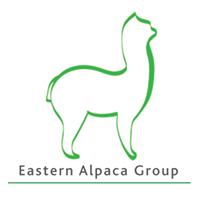Westpoint Farm Vet, Ami Sawran, gave a talk entitled “Top reasons for vet calls over the winter months” via Zoom.
Ami started by talking about what a sick alpaca looked like, and made the point that as alpacas don’t show illness until they are very sick, the owner’s instinct that there is something wrong, based on very subtle signals is very often right. She explained how to prepare for a vet visits and some of the questions that the vet might ask – and why. She also explained about the diagnostics tests that the vet might be able to do and that these aren’t necessarily going to be able to tell the vet exactly what is wrong and why.
She then went on to deal with the topics that cause problems in winter and what owners can do. Good shelter is important and needs to be attractive to alpacas. Weight loss can be due to parasites or to do with nutrition and it’s important to understand that cold, wet weather could drastically increase the energy needs of alpacas. She also explained that alpacas are prone to digestive problems and providing high quality forage products such as grass pellets or bagged dried grass, sugar beet or alfalfa is likely to be better than increasing hard feed. She also explained that alpacas are prone to cancers such as gastric lymphomas including at a young age and that inflammatory bowel disease is probably under-diagnosed.

Weanlings need particular care through the winter as the stress of weaning is exacerbated by the season. Failing to provide sufficient Vitamin D can lead to ricketts most likely to lead to subtle signs such as painful joints and the alpaca shifting weight rather than the dramatic pictures of bent limbs. Vitamin D also helps lactating females. She finished by discussing gastric intestinal upsets including colic and choke; making the point that the severity of symptoms doesn’t predict what type of colic it is. When dealing with choke, the most important thing is to stay calm – it looks terrible but often will resolve itself. The important action is to remove the food that has caused the choke as the alpaca might try to eat some more and exacerbate the inflammation in the oesophagus. Any massage of the throat must be very gentle and the vet may need to attend to give pain relief and anti-inflammatory, muscle relaxants and antibiotics.

Dr Ami Sawran will be well known to EAG members as a local vet who has a special interest in Alpacas. She presented a birthing workshop for us last March. Ami qualified from Liverpool University in 2011, after which she completed an internship in production animal health at the Royal Veterinary College, where she also studied for her PhD. She is currently clinical director of Westpoint Farm Vets in Chelmsford. Ami is very enthusiastic about camelid medicine, and is working towards her advanced certificate in camelid practice. She also heads the Westpoint Small Ruminant and Camelid Group, and the Camelid Special Interest Group for VetPartners, where she also sits on the Production Animal Clinical Board.

This talk was recorded and we hope to make the recording available soon for those that missed it.
